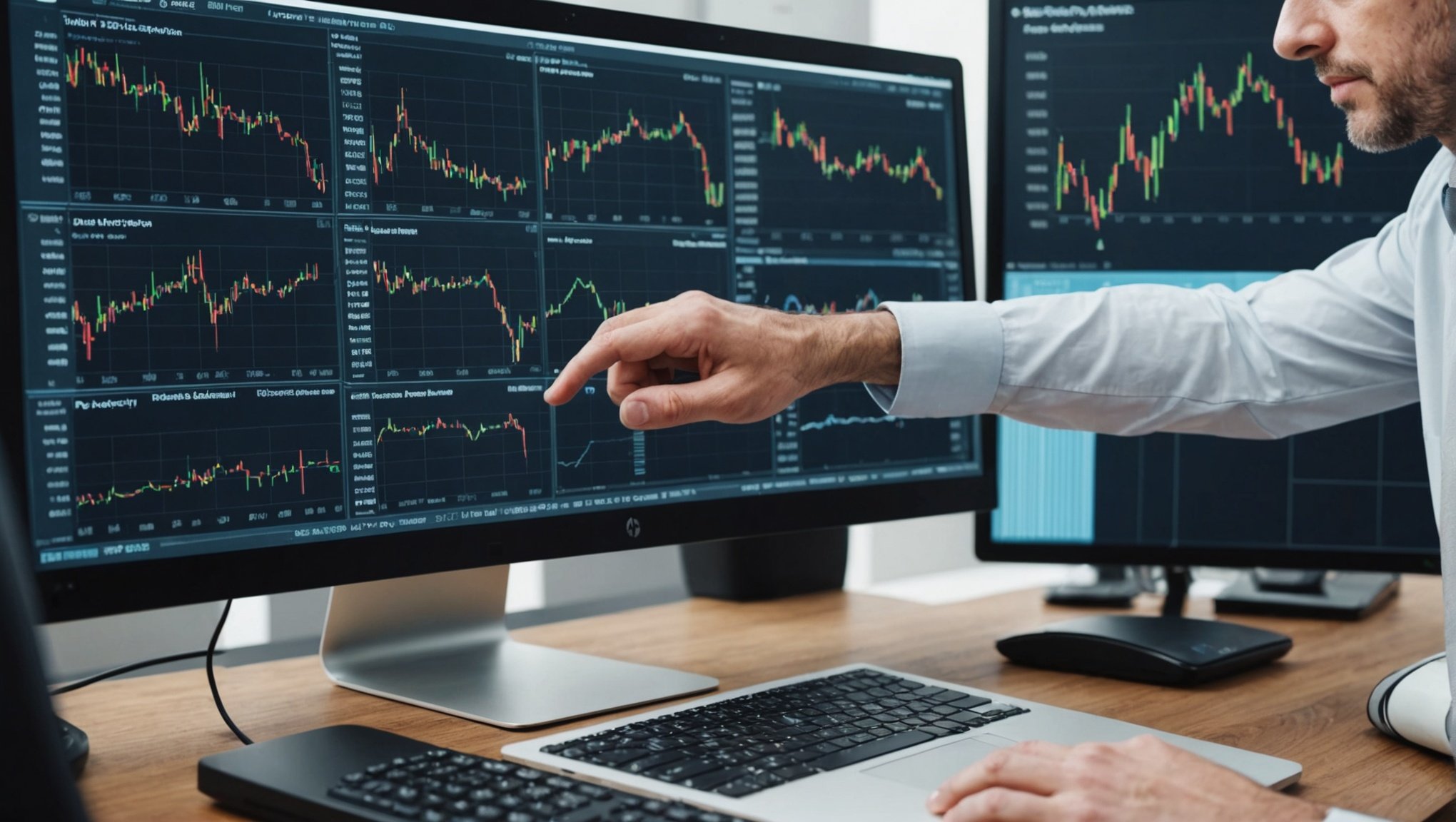Unlocking Precision: Leveraging AI to Boost the Accuracy of Financial Trading Algorithms
In the fast-paced and highly competitive world of financial trading, accuracy and speed are paramount. The integration of Artificial Intelligence (AI) and Machine Learning (ML) has revolutionized the way traders make decisions, analyze data, and execute trades. Here’s a deep dive into how AI is transforming financial trading algorithms and what this means for traders.
The Power of AI in Financial Trading
AI, particularly through ML, has become a game-changer in financial trading by providing tools for advanced data analysis, risk management, and automated decision-making.
Also to discover : Unlocking the Power of AI: Transforming Logistics and Delivery Systems for Greater Efficiency
Analyzing Vast Amounts of Data
AI models can analyze vast amounts of historical and real-time data to predict future trends with high accuracy. For instance, AI can forecast market fluctuations, cash flow projections, or consumer behavior patterns, giving businesses more insight to make informed financial decisions. A study by McKinsey shows that companies leveraging AI for financial forecasting can reduce errors by 30-50%, leading to more precise decision-making.
Predictive Analytics and Market Trends
AI algorithms can identify patterns in market trends that human traders might miss. These algorithms analyze market trends, historical data, and other variables to predict stock price movements, optimize buy/sell decisions, and execute trades faster than human traders. Hedge funds and trading firms like Two Sigma and Citadel use ML models to outperform traditional trading strategies by identifying profitable trading opportunities in real-time.
Topic to read : Revolutionizing Language Translation: Enhancing Accuracy Through AI Innovations
Enhancing Risk Management
Real-Time Risk Detection
AI helps businesses manage financial risk more effectively by identifying potential threats and vulnerabilities in real time. Through AI-powered algorithms, companies can detect patterns in fraud, market volatility, and credit risk, helping them mitigate risks before they escalate. For example, AI models can flag unusual transactions or behaviors that may indicate fraud, enabling quicker intervention and minimizing financial loss.
Credit Scoring and Lending
Traditionally, credit scores were calculated using limited financial data, but with AI and ML, financial institutions can now include a broader set of data points—such as spending habits, payment history, and even social data. AI-powered credit scoring models continuously improve over time, making predictions more accurate and inclusive. This allows lenders to make better decisions about extending credit, reducing the risk of defaults while increasing opportunities for previously underserved populations.
Algorithmic Trading: The AI Advantage
Speed and Efficiency
Algorithmic trading, driven by AI and ML, executes trades at lightning speed, far surpassing what humans can do. These systems can analyze vast amounts of data and execute trades in milliseconds, capitalizing on fleeting market opportunities that a slower human trader might miss. Platforms like Alpaca offer commission-free API-first brokerage services, allowing programmers and new traders to build, test, and deploy automated trading strategies effortlessly.
Emotionless Decision Making
Human emotions like fear or greed can cloud judgment and lead to costly investment mistakes. AI bots, however, make decisions based on cold, hard data, eliminating the influence of emotions entirely. This ensures that trading decisions are consistent and based on predefined strategies, rather than emotional reactions to market movements.
24/7 Market Coverage
The stock market never sleeps, and neither do AI bots. They can monitor the market around the clock, allowing traders to capitalize on potential opportunities even while they are away from the screen. This continuous monitoring is crucial in today’s fast-paced financial markets, where timely reactions to market conditions can make a significant difference in trading outcomes.
Top AI Trading Tools for Enhanced Precision
Here are some of the top AI trading tools that are empowering traders to make more accurate and informed decisions:
-
Stock Rover: Offers unique research and screening capabilities to help traders dive deep into company fundamentals. It provides real-time alerts and is perfect for investors aiming to leverage comprehensive data.
-
Trade Ideas: Scans the markets for patterns and anomalies, providing actionable trade ideas using strategies optimized daily. It includes simulated trading environments for beginners to hone their skills risk-free.
-
Alpaca: Provides commission-free API-first brokerage services, ideal for programmers and new traders. It allows users to build, test, and deploy automated trading strategies effortlessly.
-
3Commas: Specializes in automating crypto trading with its bot marketplace and Smart Trade feature. It empowers users to maximize profits and minimize risks with pre-built and custom bots.
-
Pionex: Renowned for its Grid Trading Bot that capitalizes on market volatility by buying low and selling high within set parameters. It is ideal for beginners exploring automated strategies.
Multi-Agent Systems in Financial Trading
Enhancing Portfolio Management
Multi-agent systems (MAS) are transforming portfolio management by enabling more sophisticated and adaptive investment strategies. These systems can analyze different aspects of the market simultaneously and adapt their strategies based on changing market conditions. For example, BlackRock’s Aladdin platform uses MAS principles to manage trillions of dollars in assets, combining risk analytics with portfolio management tools for more informed and data-driven investment decisions.
Automated Trading Systems
MAS is also used in high-frequency trading firms to develop automated trading systems. These systems can execute trades in milliseconds based on market conditions, analyze vast amounts of data to identify profitable opportunities, and manage risk by quickly adjusting positions. Two Sigma, a quantitative hedge fund, uses MAS to power its algorithmic trading strategies, processing terabytes of data daily to make rapid trading decisions.
Predicting Market Trends
MAS can predict market trends by simulating the collective behavior of market participants. These systems can identify emerging patterns before they become obvious to human traders and forecast potential market reactions to economic events or news. JPMorgan Chase’s DeepX system, for example, analyzes market trends and provides trading recommendations to its clients by processing vast amounts of financial data.
Prerequisites for Algorithmic Trading
To effectively navigate the world of algorithmic trading, several prerequisites are essential:
-
Access to Quality Data: Reliable and up-to-date data is the cornerstone of effective algorithmic trading strategies. Traders need access to high-quality data to develop and optimize their trading algorithms.
-
Charting Platforms: A solid understanding of charting systems and strategies is crucial. Leading platforms like eSignal and MetaStock offer comprehensive trading functionality and analytics.
-
Proficient Programming: Designing, developing, optimizing, and implementing trading algorithms requires proficiency in programming languages such as Python, R, or C++.
-
Broker Selection: Choosing a reputable broker with low-latency execution and efficient order handling is vital. Key considerations include platform speed, reliability, offered segments, brokerage fees, leverage, and margin requirements.
-
Regulatory Compliance: Algorithmic traders must adhere to rules and guidelines established by relevant financial authorities to ensure compliance with banking regulations.
Ethical Considerations and Positive Use Cases
While AI trading tools present exciting advancements, they also raise ethical considerations such as market fairness and transparency. However, these tools are generally leveling the playing field for investors, enhancing market efficiency, and providing valuable learning resources.
Ethical Considerations
It is crucial to ensure that AI trading systems operate within ethical boundaries. This includes transparency in how algorithms make decisions and fairness in market access. For instance, the Responsible AI Channel emphasizes the importance of ethical practices in AI implementations, ensuring that AI systems are used responsibly and impactfully.
Positive Use Cases
Despite the challenges, AI trading tools have numerous positive use cases. They provide beginners and seasoned traders alike with the tools to compete with professionals. For example, robo-advisors like Betterment and Wealthfront leverage ML algorithms to provide personalized investment recommendations based on users’ financial goals, risk tolerance, and market conditions. These platforms continuously learn from user behavior and market changes, adjusting asset allocations and investment strategies to maximize returns.
Practical Insights and Actionable Advice
Here are some practical insights and actionable advice for traders looking to leverage AI in their trading strategies:
Start with Quality Data
Ensure you have access to reliable and up-to-date data. This is the foundation upon which all AI-driven trading strategies are built.
Choose the Right Tools
Select AI trading tools that align with your trading style and experience level. For example, if you are a beginner, platforms like Pionex or 3Commas might be more suitable due to their user-friendly interfaces and pre-built bots.
Monitor and Adjust
Continuously monitor your AI-driven trading strategies and adjust them as necessary. AI models can learn and adapt, but they also require human oversight to ensure they remain aligned with your financial goals.
Stay Informed
Keep up-to-date with the latest developments in AI and ML within the financial sector. This includes understanding new tools, techniques, and ethical considerations that arise as these technologies evolve.
The integration of AI and ML into financial trading algorithms has significantly enhanced the accuracy and efficiency of trading decisions. By analyzing vast amounts of data, predicting market trends, and managing risk in real-time, AI systems are revolutionizing the financial markets.
As traders navigate this complex landscape, it is essential to understand the prerequisites for algorithmic trading, the ethical considerations, and the practical insights that can help them make informed decisions. With the right tools and knowledge, traders can leverage AI to unlock precision and boost the accuracy of their financial trading algorithms.
Table: Comparison of Top AI Trading Tools
| Tool | Key Features | Suitability | Ethical Considerations |
|---|---|---|---|
| Stock Rover | Unique research and screening capabilities, real-time alerts | Investors aiming for comprehensive data analysis | Transparency in data sources |
| Trade Ideas | AI-powered scanning, simulated trading environments | Active traders looking for actionable trade ideas | Fairness in market access |
| Alpaca | Commission-free API-first brokerage, automated trading strategies | Programmers and new traders | Compliance with regulatory requirements |
| 3Commas | Bot marketplace, Smart Trade feature for crypto trading | Beginners in crypto trading | Transparency in bot performance |
| Pionex | Grid Trading Bot for market volatility | Beginners exploring automated strategies | Fairness in trading opportunities |
Detailed Bullet Point List: Advantages of AI in Financial Trading
-
Speed and Efficiency: AI bots can analyze vast amounts of data and execute trades at lightning speed, far surpassing what humans can do.
-
Capitalize on fleeting market opportunities that a slower human trader might miss.
-
Execute trades in milliseconds based on market conditions.
-
Emotionless Decision Making: AI bots make decisions based on cold, hard data, eliminating the influence of emotions entirely.
-
Ensure consistent trading decisions based on predefined strategies.
-
Avoid costly investment mistakes driven by fear or greed.
-
24/7 Market Coverage: AI bots can monitor the market around the clock.
-
Capitalize on potential opportunities even while you are away from the screen.
-
Provide continuous monitoring crucial in today’s fast-paced financial markets.
-
Predictive Analytics: AI algorithms can predict market trends and identify emerging patterns.
-
Forecast potential market reactions to economic events or news.
-
Help investors anticipate shifts in market sentiment.
-
Risk Management: AI helps manage financial risk more effectively by identifying potential threats and vulnerabilities in real time.
-
Detect patterns in fraud, market volatility, and credit risk.
-
Mitigate risks before they escalate.
Quotes from Industry Experts
- “Companies leveraging AI for financial forecasting can reduce errors by 30-50%, leading to more precise decision-making.” – McKinsey
- “AI-powered algorithms can detect patterns in fraud, market volatility, and credit risk, helping them mitigate risks before they escalate.” – Artsyl
- “Multi-agent systems are transforming portfolio management by enabling more sophisticated and adaptive investment strategies.” – SmythOS
- “AI trading tools are leveling the playing field for investors, enhancing market efficiency, and providing valuable learning resources.” – Responsible AI Channel












